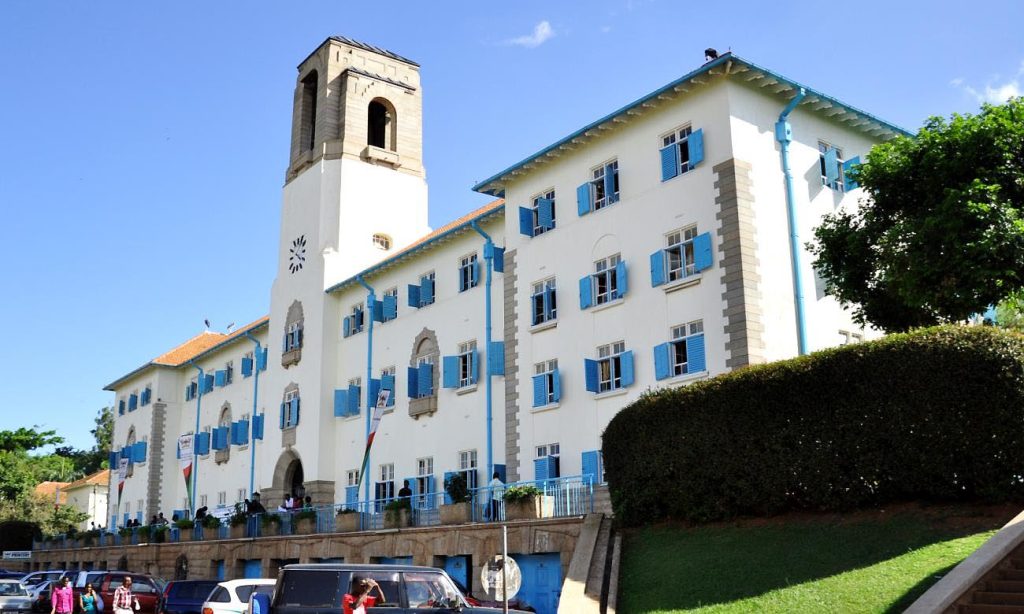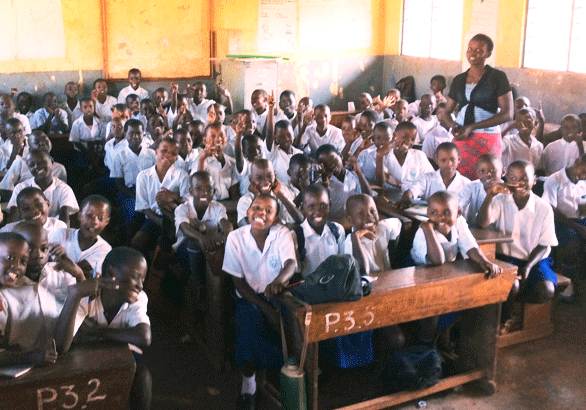Education in Uganda

Uganda was colonised by Britain and became a protectorate from 1894 to 1962 when the country acquired her independence. The British introduced formal education and christianity and taught the local people how to read and write English, which later became an official language.
Background
Europeans found an informal education system in Uganda as it was throughout Africa whereby children were taught from home by parents and elders in the community. Knowledge was passed on from one generation to another through storytelling, rituals, among other moral teachings in their local languages based on social customs.Traditional education did not require children to go school or sit for the final exams. They were instead required to keep the moral values of the family and community and put into practice the skills taught for instance; weaving, hunting, backcloth making and iron smelting.
However, formal education mainly focused on introducing the European curriculum, language, and culture. The introduction of western education was done by the missionaries including the Church Missionary Society (CMS) who arrived in Uganda in 1875. British explorers among H.M. Stanely reached the Buganda kingdom in 1862 on his expedition to discover the source of the Nile river and the great lakes of Africa.
They came into contact with the Kabaka Mutesa I and began to learn the local language and also revealed to him about the new skills and development and the impending danger of other kingdoms, especially the Egyptians to colonize his territory. Stanley assured that the British empire would help Kabaka who eventually accepted and invited them to come and teach his people through a letter that Stanley sent to England in 1875.
The British Church Missionary Society sent several teachers among them including Alexander Mackay who arrived in 1877. Kabaka offered them land to live in Nateete and Lubaga near his Palace at Mengo and Kasubi hills in Kampala capital city. They began teaching literacy and numeracy as well as how to grow cash crops and lay bricks to build structures, schools and churches.
The quick learners became teachers and they eventually started to build churches and schools making Uganda the outstanding education center in East Africa before and after independence. Some of the oldest schools included Mengo secondary school, Gayaza high school, Namilyango college school and Makerere college. Since Uganda was a British protectorate education was based on the British model however the education system has evolved with the United States of America (USA) influencing the development of extracurricular activities and the secondary and tertiary system we have today.
Current status of Uganda’s education system
The education system in Uganda is under the ministry of education and sports with a structure of 7-4-2 which is 13 years excluding the tertiary level. The structure of 7 years is for primary education, 6 years for secondary level which is divided into 4 years of lower secondary and 2 years for upper. The tertiary level goes from 3 to 5 years of post secondary education.
Primary education
This is the first level of formal education that follows a common basic curriculum for 7 years and the legal age entry for pupils in school is 6 years. There are privately managed and government aided schools. There is a wide range of options for parents to choose among private and public institutions depending on teaching capacity and resources.
In private schools the tuition paid varies depending on services provided. For public schools there is a small fee for tuition and students are asked to bring food stuffs like, maize and beans for their lunch at school. The government launched Universal Primary Education in 1997 with the aim of providing free primary education to all children in the country.

Under this program, education was offered to four children per family but parents sent every child to school exceeding the number that was suggested by the government. The policy led to an increased number of students enrolling in schools and attaining primary education. According to the Directorate of Basic and Secondary Education Ministry of Education and Sports report, the number of primary school teachers has increased from 81,564 in 1996 to 136,819 in 2023.
Despite the increased enrollment for primary education every year, completion rates are always low given that 4 out of 10 pupils don’t complete the level due to different factors. For instance; domestic violence, early pregnancy among girls, absenteeism in teachers and high school fees and others fail final exams. To complete the primary level pupils must sit for Primary Leaving Exams (PLE) and one to pass the exams has to attain either first, second or third grade.
On successful completion, one can join secondary or three year craft courses in technical school. Given that the age for primary is 6 years, there is pre-primary education for children between 3 and 5 years. All pre-primary schools are private and commonly found in big towns like Kampala capital city, Mbarara city and Jinja city. Children below 3 years can be taken care of in early childhood development.
Secondary level
Secondary education lasts for 6 years and is divided into lower (ordinary level) and upper (Advanced level). The Lower secondary consists of 4 years of schooling from senior one to senior four. At the end of which students undertake ordinary-level exams called Uganda Certificate Education (UCE) in at least 8 subjects and a maximum of 10 of which two are elective subjects.
These include; English, Mathematics, Physics, Chemistry, Biology, History, Religious Education (Christian or Islamic Religious Education ) and Geography. However, the curriculum of lower secondary was reviewed by the National Curriculum Development Center reducing from 21 to 12 subjects in February 2020. This curriculum is aimed at meeting the learners needs in regards to skills, and training.
The schools are supposed to teach senior one and two 12 subjects where by 11 are compulsory and 1 to be selected from the elective menu. Students in senior three and four take a minimum of 8 subjects and a maximum of 9 where 7 are compulsory and 1 or 2 to be elective. The compulsory subjects include; english, mathematics, physics, chemistry, biology, history and political education and geography. The official document shows that one has completed ordinary-level exams is the Uganda Certificate Education (UCE).
The next level is an advanced certificate of education commonly known as A-level which lasts for 2 years and consists of senior 5 and 6 classes and follows a British academic model. Students take 5 subjects either in arts or sciences and the award is Uganda Advanced Certificate of Education (UACE) after a successful completion of the level. Among the 5 subjects includes subsidiary subjects for instance; Sub-mathematics, Information Communication Technology and General paper. A successful completion of A-level opens up opportunities for candidates to join tertiary education. This includes a wide range of institutions like universities, colleges, technical training, and vocational institutes.
Tertiary education
Tertiary education is a post secondary level with a wide range of institutions of higher learning like; private and public universities, colleges, technical, and vocational institutes. These institutions are regulated by the National Council for Higher Education. Each institute has cut-off points for each course offered. There are over 46 universities in Uganda grouped under different categories like; government, private and religious- affiliated universities. Public universities include;
Makerere University
The institute is located on Makerere hill 3.5 km from Kampala capital city. Makerere university is Uganda’s largest and oldest institution of higher learning that was established as uganda technical college in 1921 to offer carpentry, building and mechanic classes. Later in 1922 more courses were added including arts, medicine, education and agriculture and was renamed Makerere college.
In 1928 vocational studies were separated from the college and to Kampala Technical school and the college started offering certificate courses. Furthermore, in 1949 Makerere college was granted a university status and became makerere college, University of East Africa and an independent national university offering a wide range of courses in the 1970s.
Today, Makerere University is composed of 10 constituent colleges offering undergraduate and postgraduate programmes both day and evening. According to the Times Higher Education, the institution was ranked number four among the best in Africa and highest in Sub-Saharan Africa in 2016.
Makerere university has nourished many post-independence African leaders, including Apollo Milton Obote the president of Uganda, Mwai Kibaki for Kenya, Julius Nyerere and Benjamin Mkapa for Tanzania and Joseph Kabila for DR Congo. There are 8 institutions affiliated to Makerere University and these include; Makerere University Business School, Mbale school of hygiene, Mulago paramedical schools, Mbale school of clinical officers, Kinyamasika seminary, Ggaba seminary, Katigondo seminary and Alokolum seminary
Kyambogo University
Located on Kyambogo hill 8 km east of the central business district, Kyambogo university is a public university established in 2003 by merging Uganda polytechnic, Institute of Teachers Education and Uganda National Institute of Special Education. The institute has six faculties and schools offering programmes like engineering, social sciences, agriculture, management and entrepreneurship. There is also an institute for distance learning, E-learning and learning centers. Kyambogo university is renowned for producing the best teachers in the country.
Makerere University Business School (MUBS)
MUBS is located on plot 21A Port Bell road 6km (10 min) east of Kampala in Nakawa division. Makerere University Business school offers mainly business and management education at certificate, diploma, undergraduate and postgraduate levels. MUBS was established in the 1960s as National College of Business studies offering business and management diplomas as well as professional training in business.

The main diploma courses offered were a uganda diploma in business studies and the higher diploma in marketing. Later in 1997 the faculty of commerce at Makerere university was merged with national college of business studies thereby creating MUBS as a constituent college of Makerere university. Due to changes in the laws of Uganda in 2001, MUBS transformed from a constituent college to a public tertiary institution affiliated to Makerere university. Mubs has grown over the years and expanded by opening up other study centers across the country. For instance, MUBS Jinja, Arua, Mbale and Mbarara campuses.
The university has a number of notable alumni in the fields of Academia, Business, Entrepreneurship, Politics, Entertainment and society.
Busitema University
The institute is one of public universities and degree awarding institutions in Uganda. Busitema university has its main campus in Busitema, Busia district on Jinja Tororo highway, 26 km (16min) southwest of Tororo and 186 km (4-hr drive) east of Kampala. The university focuses mainly on fields of agricultural sciences, agricultural mechanization and agribusiness.
The university faculties are located in different places each having its own campus. For example; the main campus in Busia district having faculty of engineering, Nagongera campus in Tororo with faculty of sciences and education, Arapai campus in Soroti hosting faculty of agriculture and animal sciences, Mbale campus with faculty of health sciences, Namasagali campus in Kamuli with faculty of natural resources and environmental sciences.
Mbarara University of Science and Technology (MUST)
The institute is located in Mbarara city 269 km (5-hr drive) southwest of Kampala and 65km (1-hr drive) from Lake Mburo national park. MUST was established in 1989 to address the shortage of scientists in Uganda. There are 6 faculties which include; Faculty of medicine, applied science and technology, interdisciplinary studies, business and management sciences, computing and informatics and science. The 2 institutes include; Institute of Tropical Forest Conservation and Maternal Newborn and Child Health Institute.
Muni University
The university is located on muni hill south of Barifa forest, 3 km southeast of Arua city and north of Muni National Teachers College in the West Nile sub-region of Uganda. Muni started as a private institute under the name WestNile University. Following a delegation of elders of the region who made a request to the president in 2007, it became a public university and renamed Muni University in 2013. The university offers different programs which include; Bachelor of Science in Information Technology, nursing science, science in agriculture, business management and entrepreneurship, science with education and information systems.
Kabale University
The institution is a public and degree award winning university in Kabale municipality. Kabale university is located 1 km off kabale-katuna road, 409 km (9-hr drive) southwest of Kampala city. The institute started as a private entity in 2001 by stakeholders in the Kigezi sub-region with the aim of contributing to social-economic development of the region through research, training and decentralization of the service delivery.
In 2012 after lobbying from stakeholders, the government indicated its willingness to take over the private university and became a public university. Kabale university has 7 faculties which include; faculty of computing, library and information science, education, engineering, technology, applied design and fine art, science, arts and social sciences, economics and management sciences, agriculture and environmental sciences. There are 2 schools which include; school of medicine and institute of languages.
Lira University
Lira university is one of the public universities and degree-awarding institutions in the country. The university is located 11km northwest of Lira Municipality, 100 km southeast of Gulu city and 336 km( 5hr and 30 min) northwest of Kampala. The institute was established in 2012 with 100 students and the number has grown to over 1000 students.
Previously the institution was known as Gulu university constituent Lira college and referred to as ira university college. In 2015 the Uganda Ministry of Education elevated the college to university status effective with the academic year of 2016-2017. Lira university has different academic units which include; faculty of health science, engineering and technology, institute of management science, medicinal plants and biodiversity.
Gulu University
The university is located 5 km northeast of the central business district of Gulu and 333 km(6-hr drive) north of Kampala. Gulu university was established in 2001 by the parliament and started operating in 2002. The institute has three campuses including the main campus in Gulu, second in Kitgum and the third in Hoima.
The Hoima campus offers agriculture, information technology, computer science, environment, business studies, education and accounting courses. However there are other courses offered by different campuses like; food and agribusiness, biosystem engineering, agri-entrepreneurship and communication management, business courses, law, medicine and surgery, arts and science education.
Soroti University
The institute is located 8 km northeast of Soroti city and 296 km (5 hr drive) northeast of Kampala city, on the Soroti- Amuria road. Soroti university is a public university and degree awarding institution in uganda. The institute was formerly called Teso university as a private entity and the government of Uganda renamed it as Soroti university in 2015.
The university has two schools with 3 courses offered this include; school of medicine and health sciences, school of engineering and technology. The courses include; bachelor of medicine and surgery, nursing science, engineering in electronic and computer engineering.
Uganda Management Institute (UMI)
Uganda management institute is a government owned national center for training, research, and consultancy in the field of management and administration. It is located on Kampala-Jinja highway 3 km east of Kampala city Nakawa Division.
UMI was established in 1968 under the name of Uganda Institute of Public Administration mandated to conduct intensive in-service training for nationalists in the struggle for Uganda’s independence. UMI became affiliated to Makerere University which gave it an edge to offer postgraduate diplomas in public administration and business management along with human resource management in 1970.
The institute was granted autonomy and became independent with provision for more programs which included a masters degree in management studies, postgraduate diplomas, certificate courses and short courses. In 2014 the institute was restructured and more schools and outreach centres were developed. The schools include school of business and management, management sciences, civil services, public administration and governance, distance learning and information technology. The outreach centers are stationed in different regions of the country and these include Gulu, Mbale and Mbarara.
Mountains of the Moon University (MMU)
The Mountains of the Moon University is a public university located in Fort portal city 296 km (6-hour drive) west of Kampala capital city. The university was founded as a private, non-profit institution in 2005 with support from local district councils, religious bodies and the community.
Later in 2018 the president of Uganda Yoweri Kaguta Museveni directed that MMU be included on the list of public universities and was granted a university charter by the Uganda National Council for Higher Education. In 2021 the parliament of Uganda approved the takeover of the Mountains of the Moon University by the government and started its full operations as a public university in July 2022
The institute was established as a service for the rural communities of Uganda and center for african developmental studies so as to study, research, and create african knowledge and understanding. The courses are structured to develop analytical and applied skills.
The university has 6 schools all offering a variety of courses which include; school of health science, education, agricultural and environmental sciences, informatics and computing, business and management studies and directorate of postgraduate studies and research.
Private universities in Uganda
Religious affiliated private universities include;
African Bible university
Africa Renewal University
All Saints University Lira
Ankole Western University
Busoga University
Islamic University In Uganda
Bishop Stuart University
Uganda Christian University
Uganda Martyrs University
Kumi University
Bugema University
Ndejje Christian University
Livingstone International University
Metropolitan International University
Uganda Kisubi University
Uganda Pentecostal University
Private universities include;
African rural University
Avance International University
Cavendish University
International Health Sciences University
Kampala University
Kampala International university
Nkumba university
Stafford University
Nsaka University
St. lawrence University
University of Sacred Heart
Team University
Victoria University
International University of East Africa
Vocational education
Uganda has also got a variety of vocational institutes for students who branch off from secondary and want to acquire hands-on skills in different courses. These include; Nakawa Vocational Institute, Uganda Technical College, Buganda Royal Institute of Business and Technical Institute, Bukalasa Agricultural Training Institute, Uganda Hotel and Tourism Institute and National Teachers College.
International schools
Uganda has several international schools of British, American, French and Indian curricula which are mainly found in Kampala and its suburbs. These include; International School of Uganda, Galaxy International, Hanna International, Acorns International, Kampala International school of Uganda, Heritage International, Hill International, Ecole Francaise Les Grands Lacs, Quality International, Kinderkare International and Boston International school



